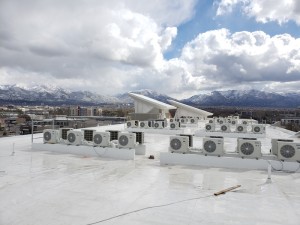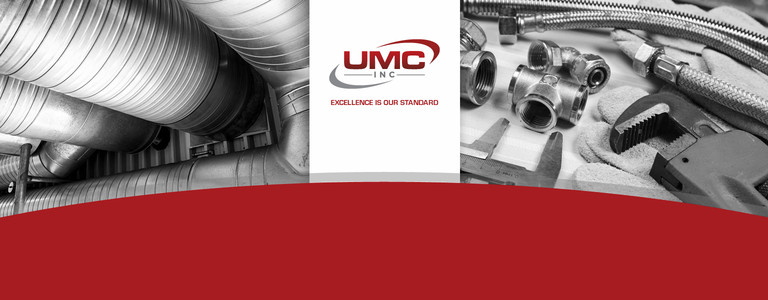
Rooftop of the Paxton 365 project, Salt Lake City, UT, 2020
Air quality is more important than ever, and many business owners are concerned about the air flowing through their building’s HVAC systems. HVAC stands for Heating, Ventilating and Air Conditioning. All air in a building flows through the HVAC system. The system itself is responsible for temperature regulation and occupant comfort.
In recent years, increased wildfire activity, air pollutants, and now the COVID-19 virus have made air quality an important consideration for business owners. Poor air quality is linked to increased health and safety issues. Older buildings may have out of date HVAC systems that are not properly circulating or filtering the air to ensure occupant safety.
Increased filtration is needed to help combat poor air quality and reduce the number of particle contaminants in a building. Air filters are a critical part of HVAC systems. Choosing the right air filter for your business and needs is important. Filters are responsible for catching the dust, pollen, allergens, smoke, and other particulates before entering the HVAC system and your building.
Filters are rated according to the MERV scale, which stands for Minimum Efficiency Reporting Values. These values measure from 1-20 and represent particle capture between 0.3 and 10 microns. Here’s a quick overview of the ratings:
- MERV ratings from 1-4 are suitable for residential furnaces and air conditioners. They capture pollen, dust mites, dust, and carpet fibers. They’re rated for the micron particle size of 10.0.
- MERV ratings from 5-8 are useful for commercial buildings, newer residential buildings, and industrial workplaces. These filters can also catch mold, dust lint, and cement dust. They’re rated down to 3.0-micron particle size.
- MERV ratings from 9-12 are used in hospital laboratories, newer commercial buildings, and high-efficiency residential buildings. They filter out everything the previous ratings do as well as lead dust, humidifier dust, and coal dust. These filters rated down to 1.0-micron particle size.
- MERV ratings from 13-16 are used for final filters, general surgery, high-efficiency commercial buildings, hospitals, and smoking lounges. They can also catch bacteria, tobacco smoke, auto fumes, insecticide dust, pet dander, face power, and bacteria from sneezing and coughing. These filters are rated down to 0.3-micron particle size.
- MERV ratings from 17-20 offer the highest level of filtration protection. These filters are used in cleanrooms that have radioactive, carcinogenic materials. They filter down to below 0.3-micron particle size.
Each MERV filter rating offers different levels of air quality protection. This past year during the COVID-19 pandemic, the CDC and the American Society of Heating, Refrigerating and Air-Conditioning Engineers recommended that schools, buildings, and homes switch to MERV-13 filters as much as possible to prevent airborne virus transmission. Making the switch can be a great way to cut back on particles entering your building, but you’ll need to get your whole system looked at as the increased filtration can put more pressure on the fans in your HVAC system.
Proper air filtration is a key part of a quality HVAC system. Using the right MERV filter for your HVAC needs is important. You want to make sure that your filters are rated for safety and are regularly switched out and serviced for the best air quality. If you require help making the switch to more high-efficiency systems, get in touch with our team.






